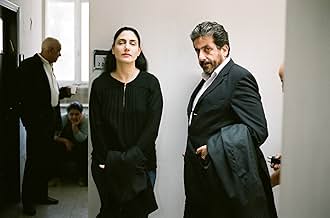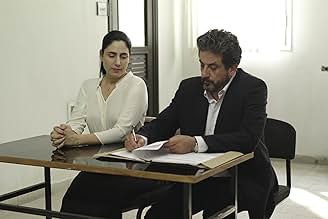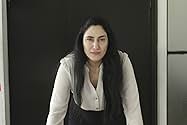Após um casamento de mais de vinte anos, uma mulher apela à compaixão de seu marido para obter um documento de divórcio há muito esperado no tribunal, o que se revela mais desafiador do que ... Ler tudoApós um casamento de mais de vinte anos, uma mulher apela à compaixão de seu marido para obter um documento de divórcio há muito esperado no tribunal, o que se revela mais desafiador do que ela esperava.Após um casamento de mais de vinte anos, uma mulher apela à compaixão de seu marido para obter um documento de divórcio há muito esperado no tribunal, o que se revela mais desafiador do que ela esperava.
- Direção
- Roteiristas
- Artistas
- Prêmios
- 15 vitórias e 19 indicações no total
- Rabbi Shimon
- (as Sasson Gabai)
- Head Rabbi Salmion
- (as Eli Gornstein)
- Rabbi Abraham
- (as Roberto Pollak)
- Rachel Amzalleg
- (as Rubi Porat Shoval)
- Direção
- Roteiristas
- Elenco e equipe completos
- Produção, bilheteria e muito mais no IMDbPro
Avaliações em destaque
Without a Get, neither spouse can remarry. If the man abandons his wife and leaves the country, the woman is in a legal limbo. This was the subject of an earlier short Israeli film, Ha-Get. In Gett, the man is available but refuses to consent. The Rabbis try all the limited avenues available to force consent (take away the driver's license, jail, etc.) but can't force the man to sign. That is the basis of Gett.
I have given Gett a 9 despite the lack of action and the focus on a less than universal problem. My reason is that, while watching Gett, I found similarities to the classic 12 Angry Men. I realize that it's a different courtroom and type of case on trial but that static tension is present in both films. The second reason is the acting skills displayed, particularly by Ronit Elkabetz. Even if you knew nothing about the divorce problem in Israel, you can read in Ronit Elkabetz' character the agony and frustration that getting a Get can cause.
I highly recommend Gett.
Winner of six Israeli Ophir Awards including Best Picture and nominated for a Golden Globe, Gett depicts the interviews and appointments Viviane has with the rabbinical court and the entire film takes place in the cramped courtroom or in the adjacent hallways. Viviane does not appear during the first few minutes as the camera focuses only on the men talking about her. She sits facing the judges and is only visible when she is being reprimanded for speaking without being spoken to. She needs no words, however, to convey the anguish clearly apparent on her face and in her gestures.
Though the trial stretches out for what seems like an endless period of time, the directors stated that similar trials may take three times as long. The dramatization of the extended trial starts and stops as we are notified by intertitles such as "three months later," "two months later," "one year later," and so forth until five years have passed. There are times when Elisha does not show up in court in spite of the rabbi's order and who threatens to revoke his driver's license, cancel his credit cards, and/or send him to jail but to no avail. If a husband refuses to grant his wife a divorce, the rabbis are powerless to force him.
Though Viviane has lived apart from him for four years and claims that they have not spoken during that time, the judges refuse to see that the marriage has gone past the point of no return and look for no solution other than having the couple remain together to try and "work it out." Witnesses are brought in to testify about Elisha being a good man (one calls him a saint) who even lets his wife go out alone. Even witnesses for the plaintiff say that Elisha has a good character. Represented by her articulate attorney Carmel Ben Tovim (Menashe Noy, Big Bad Wolves), Elisha is not accused of cheating, physical abuse, or lack of support, but only that, after thirty unhappy years of marriage, she no longer loves him and that they are incompatible.
While Elisha sits in distant silence, one witness claims that she heard Viviane yelling and throwing things inside the house. At that point Viviane says "It's easy to blame the one who yells. Those who whisper venom are innocent." It often seems as if Viviane is on trial rather than the issue of divorce. Elisha's brother Rabbi Shimon (Sasson Gabai, The Band's Visit) who is representing him, calls her a "wayward" woman and the judge takes offense when she unties the bun and lets her hair fall on her shoulders while another judge chastises her for speaking her mind. Brazenly, Shimon accuses Carmel of being secretly in love with his client and one witness testifies that she saw Viviane in a café talking to a man who was not part of her family.
As the trial drags on, it is clear that Elisha is simply not willing to let go and that he still loves his wife even if he defines it in his own terms. Gett has become a hot-button topic in Israel and is now being vigorously debated in both secular and religious circles. In fact, it mirrors a current case in New York where an orthodox rabbi has been accused of kidnapping husbands to coerce them through beatings and torture to provide a get to their wives. While there are no clear-cut victims and both characters are trapped in a heartbreaking situation, the film is a powerful indictment of archaic religious laws and traditions that make women second-class citizens. In the movie's most compelling moment, Viviane finally explodes in a torrent of rage and frustration, practically begging for her freedom. The rage and frustration is also ours.
Several comments: first, this movie is co-written and co-directed by Ronit Elkabetz (who also plays the role of Viviane) and Shlomi Elkabetz (whom I believe is her real-life husband). Second, 95% of the movie plays out in the court room, and as such is really more of a filmed stage play than it is a movie in the traditional sense. The movie consists is various family members and friends testifying as to why the divorce should, or should not, be granted. Third, most importantly, this movie spotlights the many absurdities of the Israeli court system, at least how it relates to divorce matters. The judges are rabbis and, most appallingly, the true power is held by the husband, who apparently must consent to granting the divorce. Without the husband's consent, not even the court can impose the divorce. In that sense, this movie demonstrates how a husband can abuse his wife psychologically, and there is nothing anyone can do about it. For that reason, I found the movie deeply disturbing, although I am also aware that, sadly, Israel is far from the only country where women are treated in this manner. Bottom line: "Gett: The Trial of Viviane Amsalem" is very much worth seeing, but let the viewer be aware: you may likely be pretty upset about what plays out in this Israeli divorce court drama.
I saw this movie recently at the Silverspot Cinema in Naples, FL. The early evening screening where I saw this at was quite nicely attended, which surprised me, given not only the nature of the movie, but also the theater-like style of the movie. If you are in the mood for a top-notch foreign divorce court drama that will challenge you in more ways than one, you cannot go wrong with this. "Gett: The Trial of Viviane Amsalem" is HIGHLY RECOMMENDED!
I learned--after watching the film--that Gett is actually the third movie in a trilogy about this couple. Although it would probably make sense to watch the trilogy in chronological order, Gett stands on its own as a powerful and complete film. The script contains references to earlier events, but they are presented clearly enough to allow us to understand them.
All of the actions take place in the rabbinical courtroom in Israel, and in the waiting room of the courtroom. There's not a single shot of anything outside the courtroom. It's a truly claustrophobic setting, especially because the courtroom and waiting room are devoid of any color or any objects of interest, other than the actors.
Both of the leading actors are superb. Our heart goes out to Viviane Amselem, who simply wants a divorce. She appears to be a fine person--honest, honorable, and someone who has made a real effort to be and remain a good wife. However, the marriage for her is dead, and she wants to leave the marriage and move on with her life. She has wanted this for five years, and still she is not divorced.
Her husband, Elisha, is not a cardboard cutout villain, which would actually make things easier for us as viewers. He is a handsome, intelligent, well-spoken man. However, he appears emotionally cold and aloof. I wonder if he might have a condition somewhere along the autism spectrum. Certainly, his interactions with others--the judges, his wife, the witnesses--are uniformly cold and almost robotic.
What we learn is that there is no such thing as a "civil court" for divorces in Israel. The rabbinical court is the only court. In the United States, a highly observant Jewish woman might go to a rabbinical court to obtain a Gett. If her husband refuses to give her a Gett, she can't be divorced from a religious point of view. However, if she is desperate enough, she has the choice of going to a civil court and getting a legal divorce. (This may not be considered an option by a highly observant woman, but she has the legal option, whether she chooses to use it or not. In Israel, she doesn't have the legal option.)
What I took away from this film is that the Israeli legal system is broken in respect to divorce. The rabbis can ponder. They can quote from the Talmud. They can subpoena witnesses, they can freeze someone's bank account or credit cards. They can cajole, they can reason, they can fume. What they can't do is make a husband give his wife a Gett.
This film was shown at the excellent Dryden Theatre in Rochester, NY as part of the matchless Rochester International Jewish Film Festival. Unfortunately, we were unable to be at the theater that night, so we bought the movie on DVD. It worked very well on DVD--it's basically a courtroom drama, so there's not any scenery or action shots that would do better on a large screen.
Note: A booklet was Included in the DVD, which contained commentary about the film. That's how I learned about the two earlier movies: To Take a Wife (2004) and Seven Days (2008).
Você sabia?
- CuriosidadesRonit Elkabetz's final film before her death.
- Erros de gravaçãoVivian wears only one big ring on her forth finger of her left hand throughout most of the movie. Somewhere in the middle of the movie, Vivian is shown sitting at the bench in the "court" and there is also a second ring on her second finger.
- Citações
Viviane Amsalem: Why are you making me run around in circles? Why, Your Honor? Why? Why have I come in and out for years now and nothing's changed? Why? You can't force him to divorce nor to appear, and you can't this or that, and what about me? When will you see me? When I'm too exhausted to stand before you? When? If it were up to you, it could go on for 10 years. I could drop dead in front of you and all you'd see was him! But nobody is above the law. There's a God and there's justice and He'll judge you as you judge me. Mercilessly. You don't care about me!
- ConexõesFeatured in 72nd Golden Globe Awards (2015)
Principais escolhas
- How long is Gett?Fornecido pela Alexa
Detalhes
Bilheteria
- Faturamento bruto nos EUA e Canadá
- US$ 988.150
- Fim de semana de estreia nos EUA e Canadá
- US$ 24.210
- 15 de fev. de 2015
- Faturamento bruto mundial
- US$ 1.259.160
- Tempo de duração
- 1 h 55 min(115 min)
- Cor
- Proporção
- 1.85 : 1





































